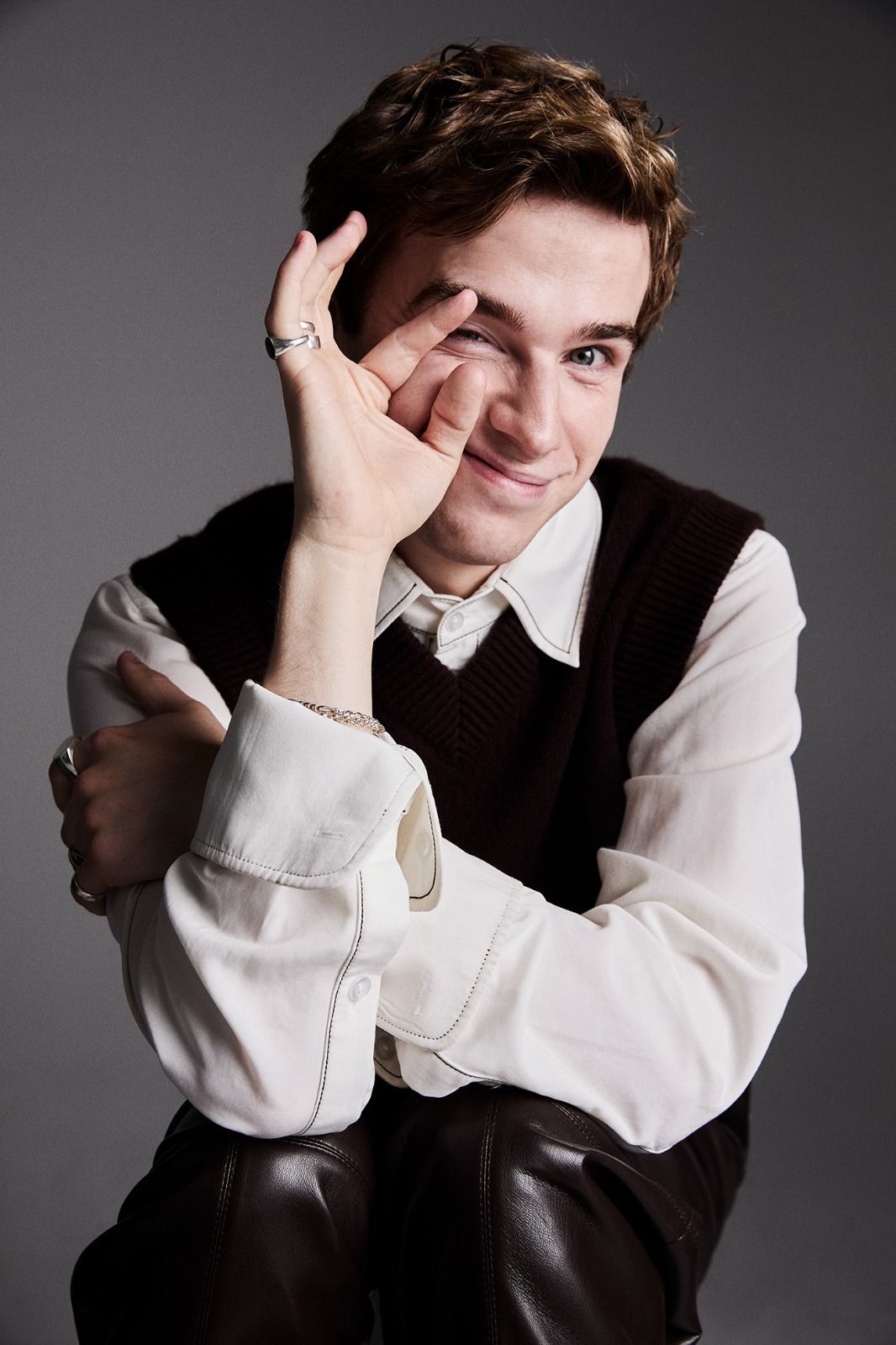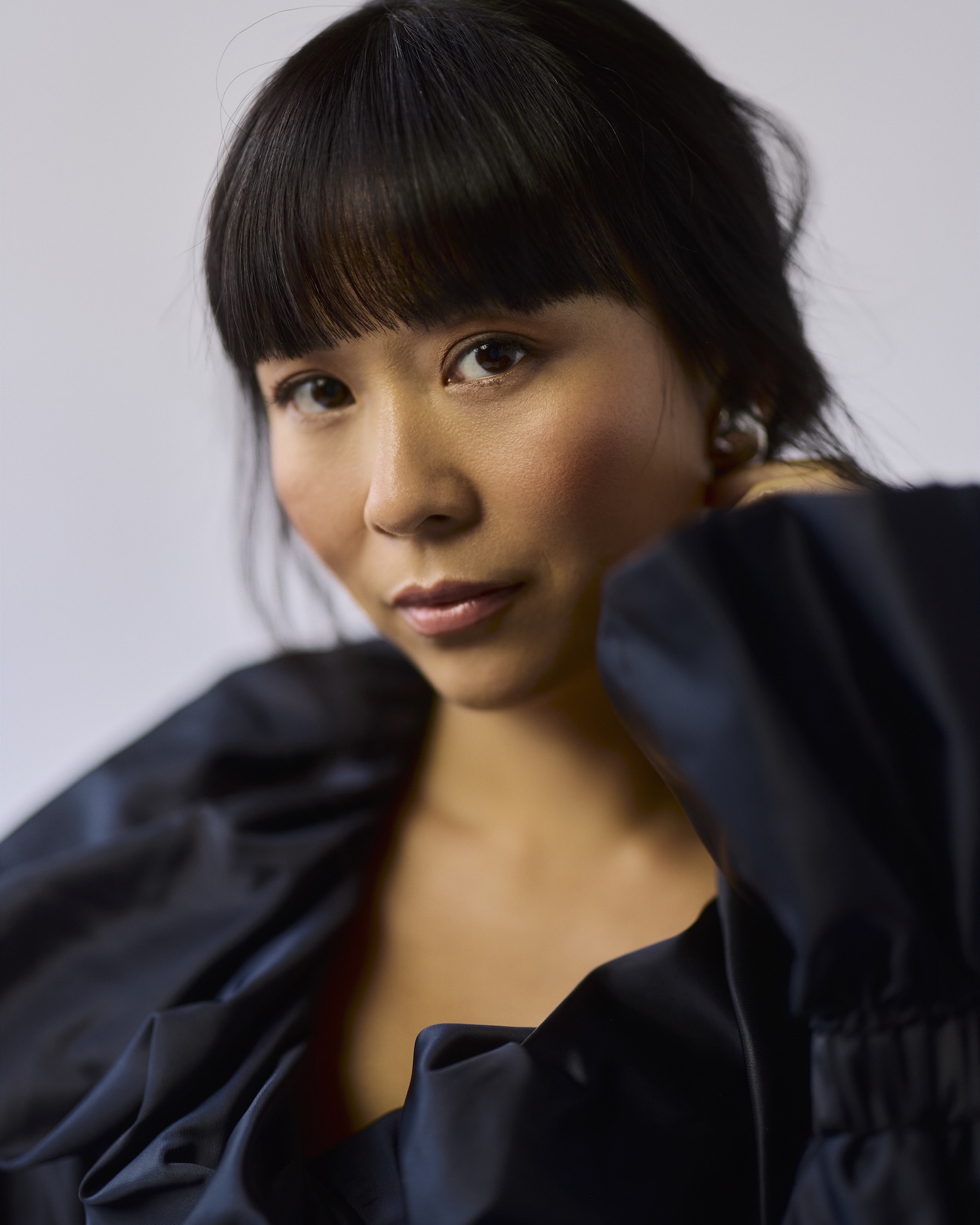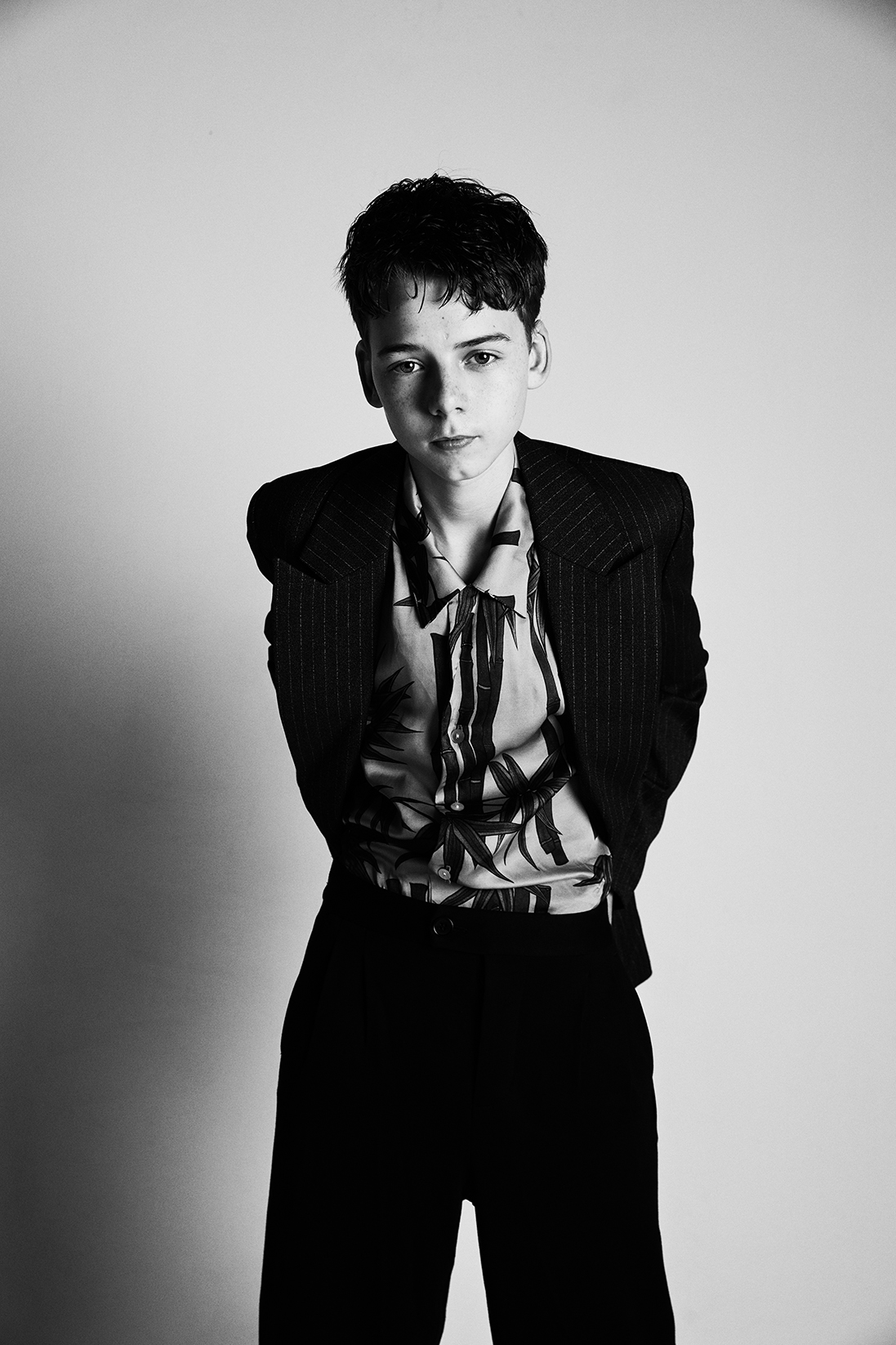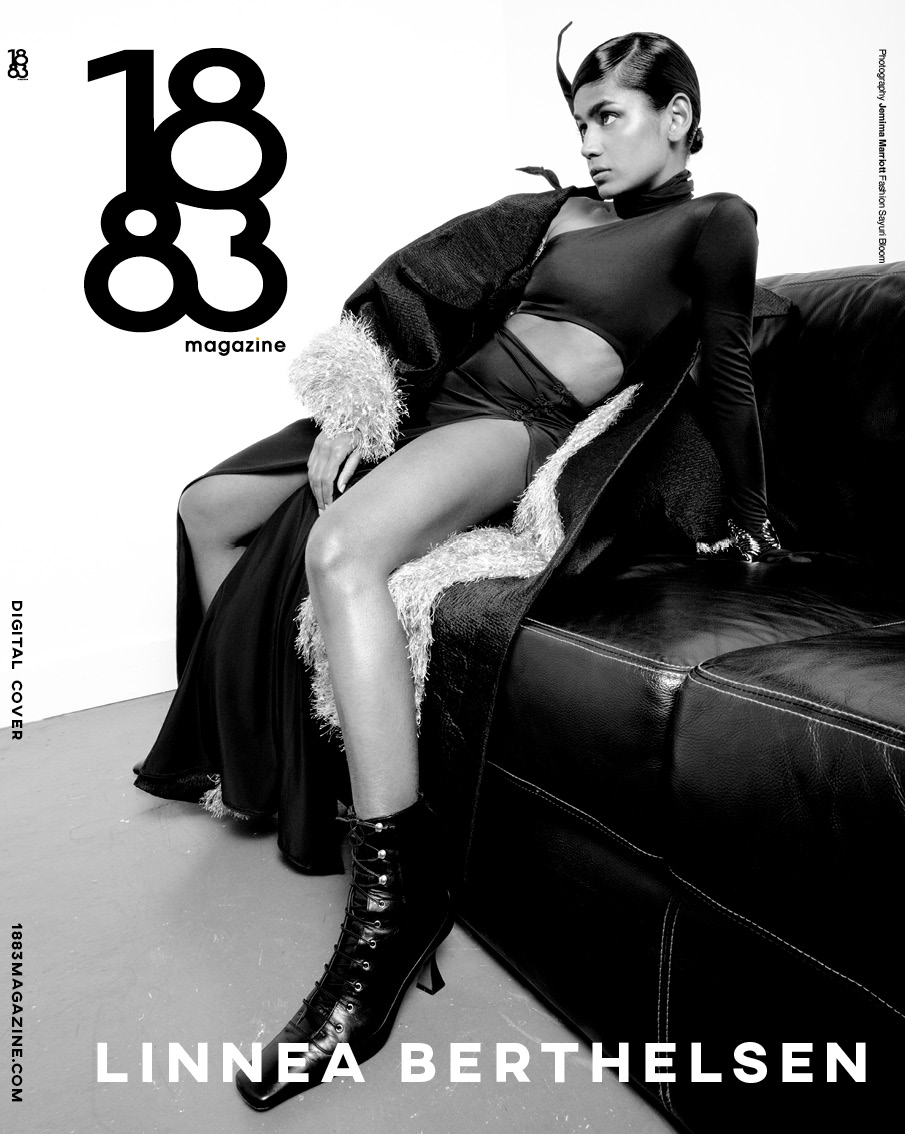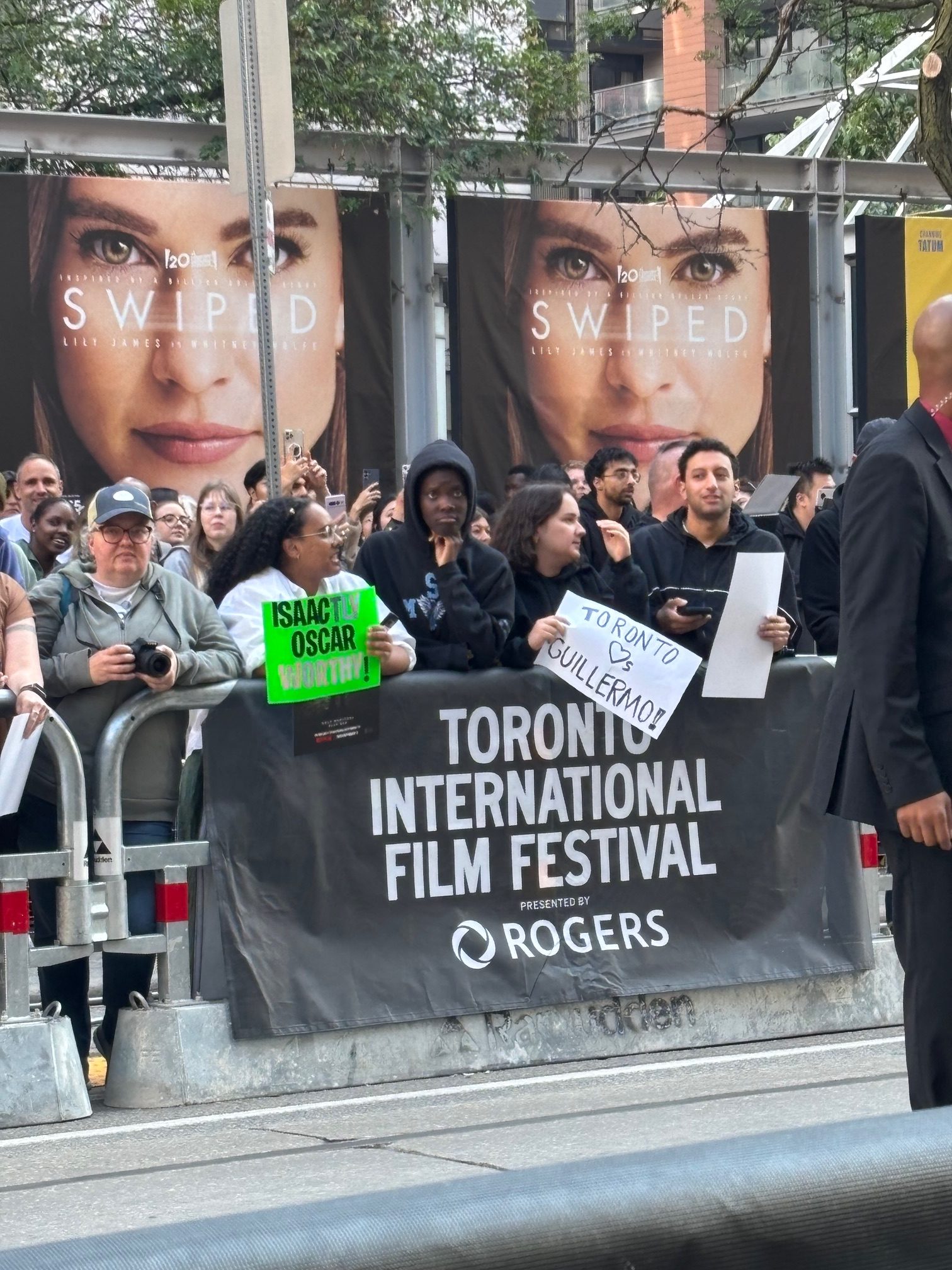Louis Landau’s character in the upcoming spy thriller series, Butterfly, is someone akin to an Aristotelian tragic hero – a proud but haunted individual whose insecurities (and evident mummy issues) lead him to spiral into a world of anger and despair. Speaking to Louis over a Zoom call one afternoon, he couldn’t seem further removed from his character’s sullen persona. Charismatic, self-depricating and equipped with an innate ability to put you quickly at ease, Louis gives the air of an actor who has been doing interviews for decades.
But in truth, his career is only just getting started: after graduating from Guildhall School of Music & Drama in 2020, Louis landed parts in Serpent Queen and Wolf King, and secured a recurring role in the Disney+ adaptation of Jilly Cooper’s Rivals, playing Archie Baddingham.
Now, Louis stars in Amazon’s Butterfly, an adaptation of the graphic novel by Arash Amel. It follows former US intelligence officer David Jung, played by Daniel Dae Kim, whose life in South Korea is upturned when his path crosses with Rebecca, a highly skilled and deadly assassin – and his estranged daughter. Louis plays Oliver Barnes, the son of David’s archnemesis Juno, a cold and calculated CEO who runs the sinister spy organisation Cadiss.
Oliver is far more sensitive and vulnerable than the other three main characters, constantly trying to prove his worth to his hard-headed mother. But Louis hopes audiences will be able to sympathise with Oliver, and see him as ‘collateral in a world that he just should never have been involved in in the first place’ as opposed to, in Louis’ words, just a bit thick.
In conversation with 1883, Louis Landau talks about why this isn’t your typical spy thriller, as well as his passion for photography, and more.
Hi Louis! How are you? Have you had a good week?
It’s been good! I’ve been down in Bristol filming season two of Rivals which is just the best group of people to do a TV show with. Everyone is so misbehaved in the best way. That’s been fun – hilarious actually. We’ve been filming with all these extras and it’s so big, you’re barely aware of when the camera’s rolling or what’s going on. And it was only afterwards when we were all at the pub that I discovered that an extra on set had been arrested.
The police had frog marched him offset in front while they were rolling on a take. He was in like, full Eighties garb. He had a mullet, right? And he rocks up in the middle of a scene, marches him off set. Incredible. Like something from the Ricky Gervais Show Extras. You couldn’t make it up. But I’m back in London now and delighted to talk to you.
I would love to talk to you more about Rivals, though I’ve just finished watching your new series Butterfly. I loved it, I binge-watched it over a weekend.
Wait, you got to watch all six episodes? I only got to watch one! [Laughs] Is it good?
It was brilliant, I would definitely recommend [laughs]
Well I’m glad you liked it – you can tell me what happens!
You’ve been in major TV series like Rivals and now Butterly, you’ve been in Wolf King as well, so you’ve got some impressive titles in your filmography. How are you feeling?
I’m feeling good, I think. I’m doing way more than I expected I would be doing. So I’m constantly just giving myself reality checks. To be honest, for so many actors, it’s just a miserable time at the moment, and I feel like so many of these big things that have happened, like the actors strike, or just whatever has happened, Covid, I’ve somehow managed to be such a jammy sod and be busy in some way.
So I feel so lucky. But of course, it’s just the constant thing with any job, comparison is just the death of all things. And you can’t help but compare yourself to whoever it is that’s doing loads and loads and loads and loads of stuff. And it’s like with everything, you just have to take stock of what you’re doing yourself and just find moments and celebrate the small successes or whatever it is. But yes, generally, I feel really happy with Rivals and with Butterfly. With both the projects, everyone who I got to work with was just so lovely, and I just had a really good giggle and a gossip.
Is there anyone you’ve worked with in particular who’s inspired you?
The first ever job I ever did was a show called The Serpent Queen, and my dad in that was an Irish actor called Colm Meaney. He is a force of nature, and he is just a fascinating human being. And the first time I met him, he was choking on a polo mint trying to complain to his accountant about UK tax laws [laughs]. You just meet these great big characters who have been around for a while. And I think especially when you’re starting out, it’s so important to surround yourself with people who are just nice to be around and treat people on set with respect and dignity.
Because ultimately, at the end of the day, we get treated abnormally well on a set, and it’s just for financial reasons. It’s because if we go missing for any length of time, we’re hemorrhaging money. I think some actors can take that on board and give off an energy which is not necessarily pleasant or productive to be around.
But I’ve been very lucky that all of these older actors like David Tennant [on Rivals] and Daniel Dae Kim and Piper [Perabo], who played my mum, on Butterfly are so great and down to earth. And if you were to chat with them, there’s no airs and graces about them that give off diva-ish super stardom. And I think that’s been a really important part of learning from them how to navigate this weird industry with respect towards others.
Have you always wanted to go into acting?
I’m the youngest child [laughs] – so many actors are the youngest child! It’s always been in my nature to be performative and make people laugh. I’m also a child of divorce. So many actors are, you’re desperately trying to keep your family together by being a performative little clown. It’s such a trope, but from a young age, I just loved it. And to be honest with you, I could say something really wanky and pretentious about the craft or whatever, but honestly, I just love it, and I’m not good at anything else, so why question it?
I don’t think that’s necessarily true – I’ve seen on your Instagram that you’re very good at photography as well. Can you tell me a bit about that?
Someone’s been snooping! Yes, I love photography. I’ve actually just had a roll of film developed 10 minutes ago, using this really ridiculously nerdy camera – and all the pictures have come out so badly. You get a camera and you think, oh, super cool, I’m going to take some photos. And then you go to get a roll of film developed, and it’s like, that’ll be 30 quid. Whoa, okay, God, so they better be good. But actually, they’re not good [laughs].
What I love about photography is that the failure is private, whereas with acting – not necessarily in drama school but when you’re in the industry – you don’t have much freedom to try something really crazy, because you know that potentially millions of people will watch it and it might be shit, whereas with photography, I can try around loads of stuff and it not work. I just love people. I’m fascinated by people. So I think there’s a crossover between acting and photography.
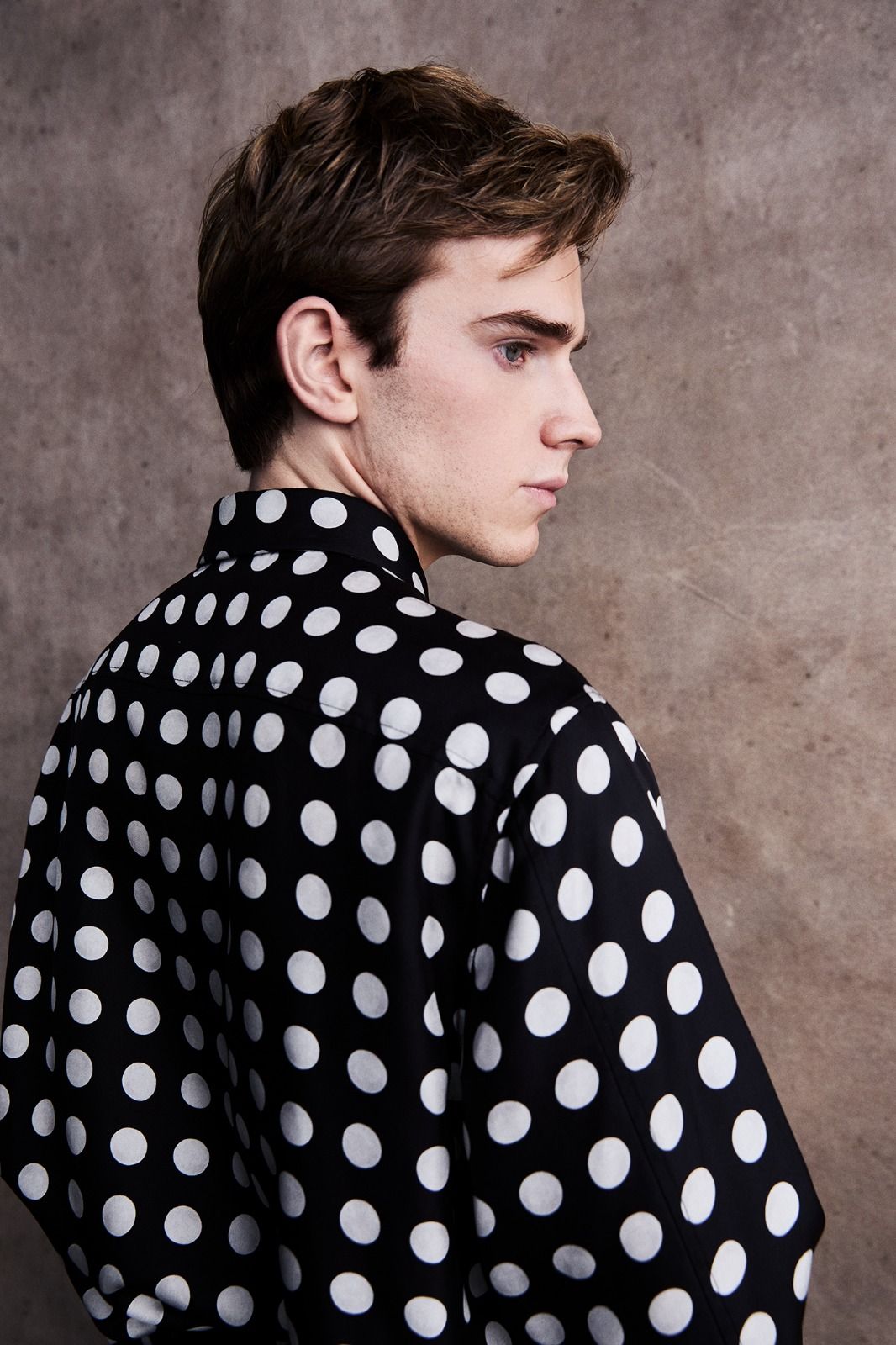
Would you like to be behind the camera more in the future?
I think it’s definitely something I’ve thought about in the past. Self tapes have become such a huge part of our industry. I think a lot of actors find self tapes like a horrible, grueling part of the industry. But I actually love self taping, but more so I love helping people with self tapes. I love mining a text, [finding all] the clues that you can find to give yourself room to play and make choices. And I love helping someone get there. And so that aspect of directing I find really appealing which you definitely find more in theatre than in film and television. When it comes to directing a short film, I think there’s so many other moving parts that are part of your job there that I think I’d find quite intimidating. But never say never. Maybe one day.
Are there any directors that you particularly admire?
The Coen brothers are dream territory – I just love everything I’ve heard about the way they work with actors, the way they cast actors in their films. Even from an early stage in a film process, they cast actors who are not necessarily your classic Hollywood choices – like zany, wacky actors.
So many actors that we love now started off in a Coen Brothers film, and I just heard so many things from actors who’ve been lucky enough to work with them about how incredibly supportive and relaxed they are and to work with, and how much they give you as an actor. I think directing an actor is like a it’s like a foreign language: actors can be very sensitive, and we’ve got all sorts of funny little idiosyncrasies when it comes to tweaks in our performance and how we approach our craft, and I think you’ve really got to have developed a language to communicate effectively with actors, and they certainly have that in abundance.
Onto Butterfly – how would you describe the series? What can we expect that’s different from your usual spy thriller?
What sets this show apart from other action-y spy thrillers that I’ve watched is the focus on the family dynamic. There are so many subtleties in the scenes I have with Piper, that it was a lot to keep in mind. So I actually found more inspiration in shows like Succession than I did with Black Doves that came out recently, which is fantastic, but I found that I spent a lot of time watching shows that tend to be thematically very different from Butterfly.
Because for me, the most interesting part of it, as well as the fights and the explosions and all the exciting stuff, is actually the family dynamics between two broken families who probably wish they had the opposite child. I think Juno’s character, my mum, wishes that Rebecca was her child. And I think in many ways, David’s character wishes he had a child that was into the same things as Oliver, my character, was into. It’s just a much softer thing.
We often discussed the idea of ships passing each other in the night, that idea that there are points in our lives where maybe you are so willing to be there with your parents at a certain moment, and they’re just not emotionally able to do that with you. And later in that life, you again pass, and this time, you’re in a different place in your life. And they’re now getting older, and they’re ready to open up about something. It seems to be such a universal experience with family, that you’re just constantly missing each other, and that’s the bit I found most engaging with the scripts.
Yours and Piper’s characters have such a messy, complex relationship and it’s quite emotionally vulnerable. Did you spend a lot of time together before filming? How did you build up that trust?
You’re lucky in a job where you’ve got loads of actors to find one person who you really connect with because it’s the nature of the job that [you’re] a mercenary. You meet people, and then you stay in contact for a bit. But I was so lucky that Piper and I instantly clicked and became so close.
We spent so much time together. Ken, the showrunner, is so incredible, and between us three on our scenes, we spent so much time debating the scripts, going through every scene, mining it together. So by the time we actually got to filming, we had done so much work, and we felt so comfortable around each other that I think we had maximum freedom to explore all of these themes, feeling totally unselfconscious around each other.
Your character, Oliver, is interesting because you have the other three main characters: David, Rebecca and Juno. They’re so confident and extroverted while Oliver seems like someone who isn’t quite comfortable in his own skin. What intrigued you about him?
I think it’s exactly that aspect of it. So often we don’t feel completely comfortable in the skin that we are trying on. And I think that, of course, being super confident in what you are is what we all aspire to. But I found there was scope in what had been written to play someone who was just full of doubts, and already at a young age, was incredibly regretful over events before the show. And I just find that super engaging. It’s just a lot more interesting to me to play someone who hasn’t got their shit together. They don’t know really what they should be doing, but they’re desperately trying to maintain face at all times because of the pressure cooker environment that they’re in. It’s just so juicy.
Do you see any parts of yourself in Oliver?
Absolutely. I don’t think any actor can hide themselves with a role like this. There are transformative roles where you really are changing your voice and everything, but still you’re revealing something that maybe in your personal life you wouldn’t be so expressive about. And [during] my time at secondary school, I was that kid who was so out of place and desperately trying to be something I wasn’t.
Of course, the circumstances are completely different. I’m, in many ways, totally unlike Oliver, but that aspect of it, that core fundamental of desperately seeking a place in the world, is something I was showing of myself, and I really felt I had a connection with him.
And he changes a lot from the beginning of the series, doesn’t he? There’s a specific moment where he has to make a decision and we see him spiralling. How would you describe his character arc? And how did you get into that headspace?
This is going to sound so wanky, but I saw it as a Greek or Shakespearean-style tragedy. It’s one of those characters that does not get to have the ending. It just gets worse and worse and worse, and I think, on a boring, technical level, the way I prepared for that was spending lots of time on my own, writing lots, listening to music. I’m naturally very chatty and I like to make everyone feel comfortable, but on those days where later in the show as things unfold, I took as much time as I can to be by myself and get into that headspace and try not to exert myself and run out of social battery.
He’s also, at least to me, the most relatable character. He’s this moral compass that anchors the show, despite getting slightly less screen time than the other three characters. Did the importance of the role come through in the script when you first read it?
So often you make a big life decision about taking a job, and you actually don’t have all of that information. When I was starting to audition for this job, I didn’t know where it went. I then read the next episodes, and I’m like, ‘oh, great. Okay, this is good’.
So it absolutely was not a contributing factor in me auditioning for the part, or signing on to do the show. I thought I was kind of getting involved as a sort of baddie in a spy show, and I was blessed to then carry on reading and see that yes, as you say, he really is [important]. By the end, there’s so little agency that he possesses. So much of it is being the victim of something happening to him, or he’s been manipulated in some way.
And I think the risk – the thing that I hope we’ve managed to negotiate – is that people don’t watch and just think, what an idiot, what a twat like, come on, you’re always ending up in these stupid situations. I’m hoping that we’ve managed to find a way that people will watch and go and feel for him as collateral in a world that he just should never have been involved in in the first place, as opposed to just ‘he’s a bit thick’.
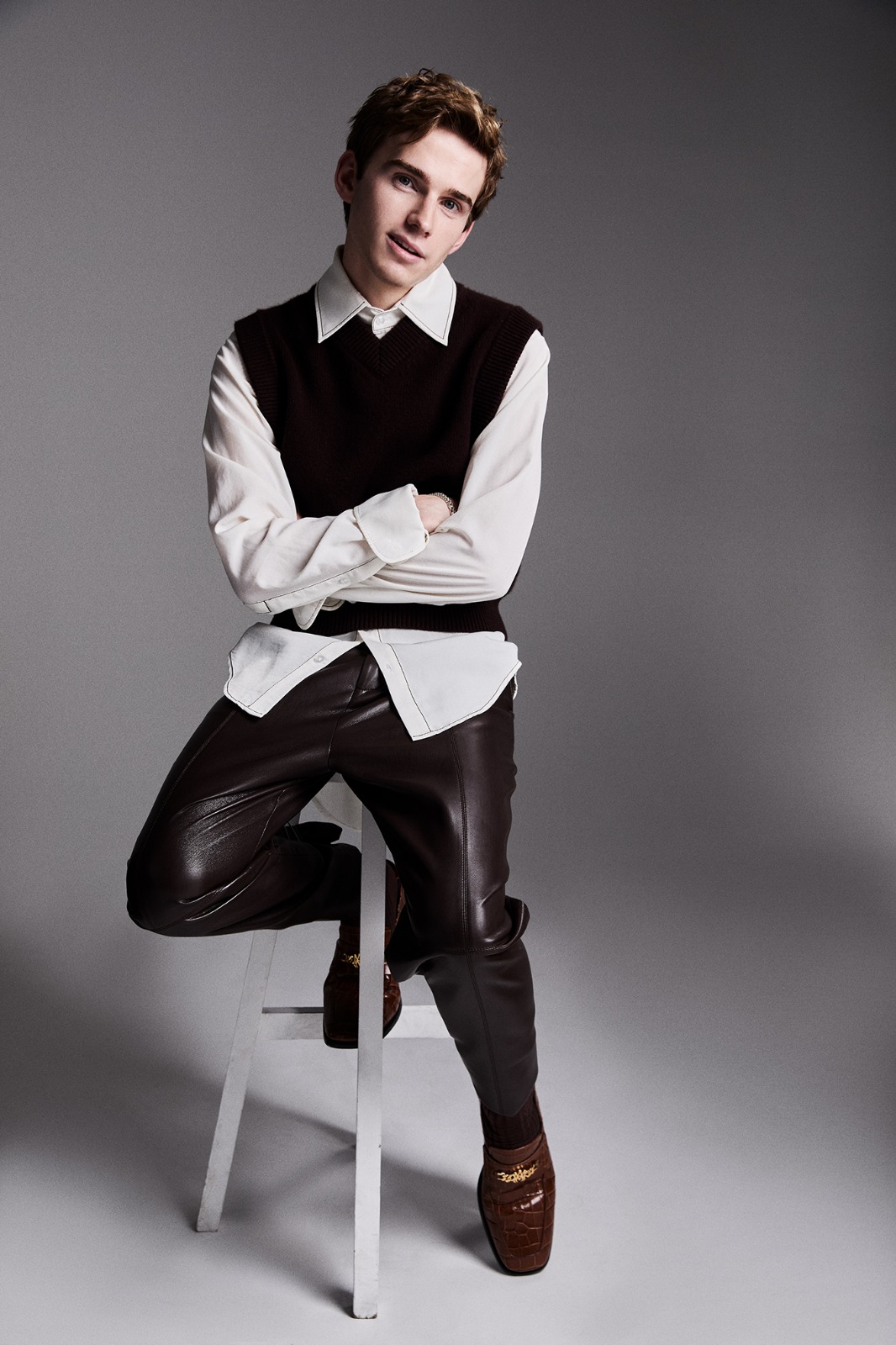
What was it like filming in South Korea?
We filmed a lot of the first half of the show in Seoul, and then we filmed a lot of the second half of the show in Busan, which is South Korea’s second city. And I just can’t talk up Korea enough. It is an amazing place. The people there are incredible. The food is amazing. If you are lucky enough to be there during cherry blossom season, you come back to the UK like ‘oh my god, take me back’. So beautiful. It’s just a joy to be there.
I have to say, South Koreans, they are incredibly lovely and friendly, but also hilariously direct. So one of the first interactions I had, I was in the makeup chair and the translator came over and said, ‘I’m so sorry if this is taking too long’. I was like, no, no, don’t be silly. They said, ‘it’s just the makeup artist, they’ve never worked as someone with a nose as big as yours. So sorry’ [laughs]. But it’s not meanness or anything. It’s just a very direct culture. Great skincare, the Mecca of skincare, my God, it’s incredible.
I’ve heard! You must have bought so much amazing skincare
I actually broke out in awful eczema right before I went over there. In the UK, if you want to see a dermatologist, you take a 500-quid hit and you get 15 minutes, maybe in four months’ time. [In South Korea], you just rock up, they see you within 20 minutes, and it’s £30. It’s insane.
What were some of the main differences between filming Rivals and Butterfly?
On Butterfly, we were lucky enough to work with a Korean director who we just called ‘director Kim’ – I think that’s how you call your director traditionally in Korea. It’s a very interesting culture; your age, your job position, your personality type – I don’t know if you’ve ever done one of those quizzes, they are mad keen on those – those three things dictate how you interact socially. And so there’s a lot of deference for position. In the UK, in Bristol filming Rivals, everyone’s very relaxed and you can have a conversation with everyone. But in Korea, it takes a bit of time for people to feel comfortable to go ‘oh we can sit and have lunch together because we’re all part of the crew’. I think that’s the big difference – the structured hierarchy of it.
But they have an amazing tradition in South Korea, their film industry is on fire on all cylinders at the moment. There’s so many good TV shows coming out of South Korea, it feels like an incredible honour to work over there and director Kim is such a legendary director. They had this lovely habit – actors will pay for this ice cream truck where you can get merch of your face as a kid or whatever, so all the crew, especially hair and make-up, collect these stickers of you. It’s so weird [laughs]. So yeah you’d have these days where everyone’s got ice creams and your face as a baby on their water bottle.
Wow, that’s so surreal!
Yeah, it was very sweet.
Thank you so much for your time, Louis. I have one last question: what advice would you give to someone starting out – say someone studying drama at university or school – on how to break into the industry?
I think my advice, which is maybe tipping into the cliché but is so true, is don’t try and be something that you imagine someone wants you to be. Don’t audition for a job in a way that you think ‘this is what the casting director probably wants me to be like’. Getting a job is so difficult and so much of the time it comes down to a reason that is so arbitrary and out of your control that it’s just a waste of time. So many actors, and I certainly have in the past, have wasted time and energy – and emotional energy – thinking about what other people want you to be like. How you should look, how you should dress or how you should approach a scene.
And it’s about having the confidence to think ‘I might not get this job, it might not work out, but I’m going to do something that’s interesting to me and I’m interested in playing this character like this.’ And maybe that’s not what they want, but who cares? There’s always another opportunity somewhere and you just have to hope the stars will align and your approach to it will align with how they see the show.
This job is a perfect example: Oliver was written as an American so I auditioned with an American accent. But when I went to the screen test and they heard me with a British accent they loved it. I don’t know if it’s weird watching the show and it’s like ‘why the hell is this guy British’? It is, isn’t it?
I did wonder at first whether they’d explain it, but thankfully they do
They do get around to it, but that was not the strategy going in. And I could have spent hours and hours working on an amazing American accent, but they just want you to be yourself and speak in your own voice and then you get the job, which you’d never get as a Brit. So, it goes to show.
Thank you again for your time Louis, the time has flown by.
Thank you so much, it was so lovely to talk to you.
Butterfly is streaming now.
Interview Anna Jane Begley
Photographey David Reiss
Styling Holly White
Grooming Charlie Cullen

